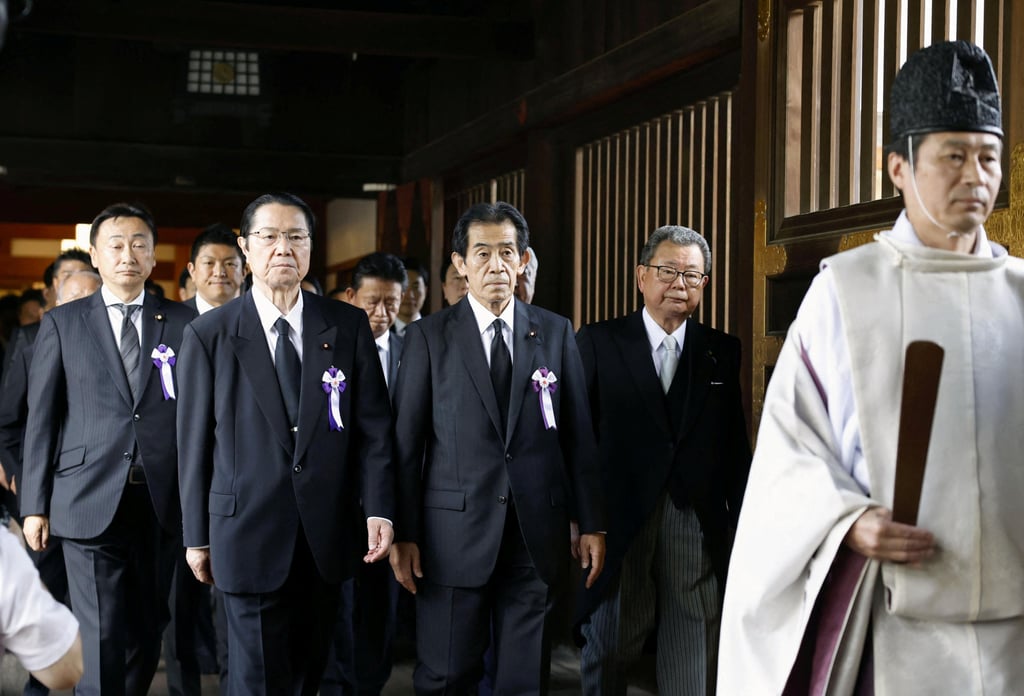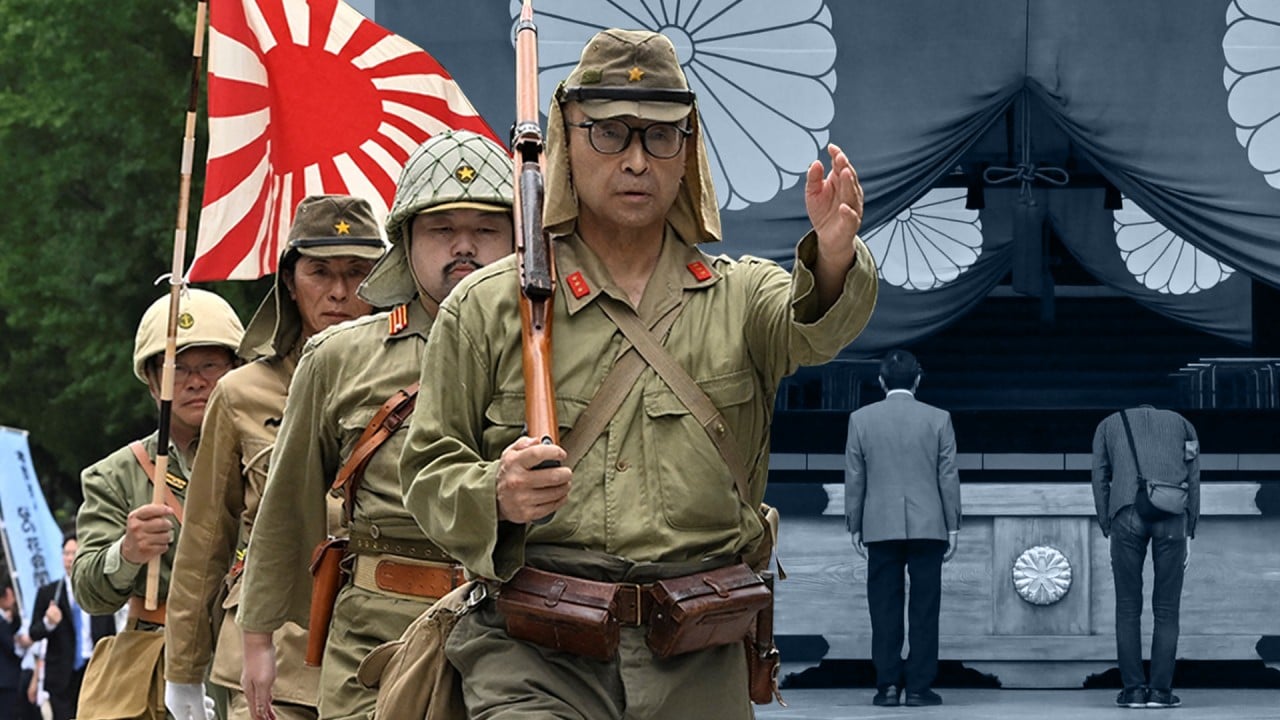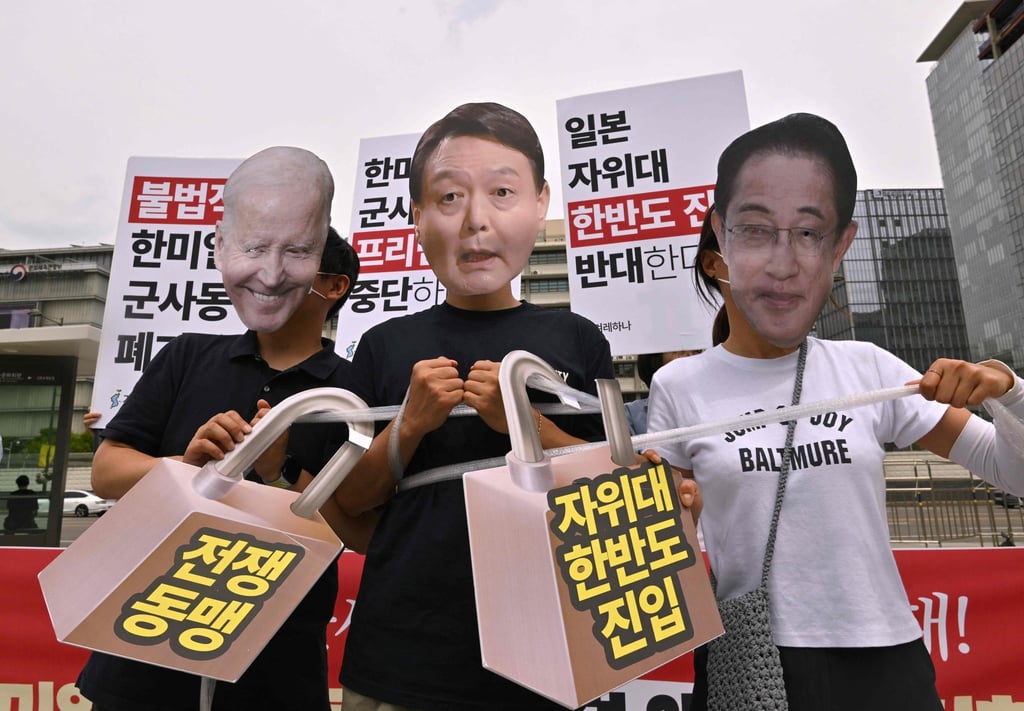
Japanese nationalists holding war flags of the Imperial Japanese Army visit Tokyo’s Yasukuni Shrine earlier this month. Photo: dpa
This Week in AsiaPolitics
‘Pro-Japanese traitors’: South Korea’s Yoon slammed over wartime whitewashing
- President Yoon Suk-yeol shocked South Koreans by omitting mention of Japan’s wartime atrocities from his Liberation Day speech

Park Chan-kyong
Published: 8:00am, 20 Aug 2024
South Korean President Yoon Suk-yeol’s decision to omit any mention of Japan’s wartime atrocities in his Liberation Day speech has ignited a political firestorm, with opposition parties branding his administration “pro-Japanese traitors” and warning the move threatens to derail efforts to resolve the countries’ long-standing historical grievances.
The controversy erupted after Yoon, in a notable break from tradition, focused his address commemorating Korea’s 1945 liberation from Japanese colonial rule on the need to promote reunification with the North and address human rights abuses by Pyongyang – all but glossing over Tokyo’s responsibility for past misdeeds.
“It’s outrageous that the Yoon government is ignoring the sentiments of the Korean people while seemingly advocating for Japan,” Han Min-soo, a spokesman for the main opposition Democratic Party of Korea (DPK), said in a statement on Sunday.
“Is it the Yoon government’s idea of justice to not hold the perpetrator accountable if they refuse to apologise?”
The fallout only intensified the next day, when Yoon’s security adviser Kim Tae-hyo declared that pressing Japan for an apology over its wartime past was futile as long as Tokyo had no intention of doing so – a remark that triggered a separate backlash.
Analysts say Yoon’s approach appears targeted at fostering closer security ties with Japan and the United States, but at the potential cost of losing domestic support. Opponents warn his omission undermines the painstaking process of improving ties between Seoul and Tokyo.

A group of Japanese lawmakers visits the Yasukuni Shrine in Tokyo on August 15. Photo: Kyodo via Reuters
The Yoon administration’s attempts to defend its stance only seemed to further inflame the controversy, with a senior official from the presidential office appearing to justify Japan’s position and suggest there was “fatigue” in Tokyo over dealing with its wartime history.
“We should strongly criticise and seek to correct Japan if it ignores historical issues and refuses to acknowledge them,” said Kim, the first deputy chief of the Presidential Office’s National Security Office, during a televised interview in which he acknowledged that Japan had issued repeated apologies, implying that the country could no longer be expected to continually atone for its past misdeeds.
“But what matters is Japan’s intent. If you force an apology from someone who doesn’t genuinely feel it, can that apology be considered sincere?”
Yoon’s critics pounced, accusing the administration of essentially admitting it was comprised of “pro-Japanese traitors” who were willing to overlook the country’s brutal colonial rule in a bid for closer security cooperation.
“Now we understand why President Yoon never criticised Japan’s colonial rule in his Liberation Day speech,” said DPK’s Han.
The comments by Kim appear to signal the Yoon government’s belief that the ongoing disputes over Japan’s wartime actions could hinder much-needed bilateral collaboration.

Place of controversy: Japan’s Yasukuni Shrine
In a verbal counteroffensive, Yoon’s ruling People Power Party on Friday accused the opposition of cynically exploiting anti-Japanese sentiments for political gain, insisting the focus should instead be on the human rights situation in North Korea.
“Seventy-nine years have passed since the liberation, yet it remains incomplete as North Koreans continue to suffer under dictatorship,” said party spokesman Shin Dong-wook, who lambasted the opposition for “dividing the people into pro-Japanese and anti-Japanese factions”.
But critics say Yoon’s own actions suggest he views the unresolved issues from the 1910-45 Japanese colonial period – including the plight of Korean victims of wartime forced labour and sexual slavery – as little more than obstacles to enhancing security cooperation with Japan and the US.
The president’s speech coincided with visits by at least three Japanese cabinet ministers, including the defence chief, to the controversial Yasukuni Shrine in Tokyo – a site many Asian countries see as a symbol of the country’s wartime aggression. His administration has also taken a series of controversial steps, including compensating forced labour victims using domestic funds and endorsing Japan’s bid to register the Sado mine as a Unesco World Heritage site, despite Tokyo’s refusal to acknowledge Koreans were forced to toil there.
The Yoon administration “sees little value in revisiting historical grievances”, said Japan studies expert Yang Ki-ho of Sungkonghoe University, arguing the president is laser-focused on strengthening a trilateral security alliance with Tokyo and Washington.

South Koreans wearing masks of South Korean President Yoon Suk-yeol, US President Joe Biden and Japan’s PM Fumio Kishida protest in Seoul against joint military drills in June. Photo: AFP
“Seoul’s current policy is to sideline issues that might strain relations with Japan,” Yang told This Week in Asia, noting that some liberal politicians believe the Yoon’s conservative government is laying the groundwork to grant Tokyo clemency ahead of the 60th anniversary of diplomatic normalisation next year.
“However, the government’s efforts to strengthen ties with Japan by burying the past are likely to backfire, as these perceived unilateral concessions have sparked public outrage,” he added.
Political-science professor Lee Jun-han argued that Japan’s apologies and subsequent measures to heal the wounds of its colonial rule and wartime atrocities have fallen far short of what most Koreans expected.
“The Seoul government believes that dwelling on historical issues would not serve national interests and would hinder progress towards a trilateral security alliance with the United States and Japan,” he said.
But law professor Kim Chang-rok of Kyungpook National University warned the Yoon administration was sending the wrong message to Japan that the historical issues had been resolved, even as Tokyo continues to push for the removal of statues commemorating wartime sexual slavery victims and denies the existence of forced labour during the war.
Choi Jin, head of the Institute of Presidential Leadership, said the controversy over Yoon’s speech had deepened the political divide in South Korea.
“This situation plays into the hands of the opposition, who accuse the government and the ruling party of being pro-Japanese and antinational,” he said.



